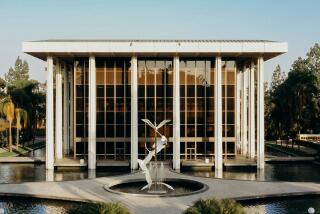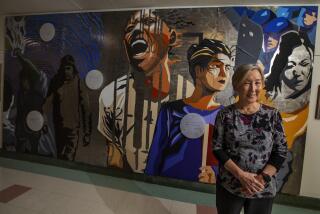KFAC Recordings: Stuck in the Stacks
- Share via
A critical lack of funds has made a virtual prisoner of the 50,000 recordings donated to Stanford University by KFAC, Los Angeles’ late classical music radio station.
Nearly eight months after being officially donated, the collection is languishing behind locked doors of a second-story, environmentally controlled storage area in the Braun Music Center on the Palo Alto campus. The collection, with strengths in opera and in classical music from the Baroque period through 20th-Century compositions, could remain immobilized and uncatalogued for as long as two years.
Barbara Sawka, head of the university’s Archive of Recorded Sound, said that the Oct. 17 Bay Area earthquake has caused the university to be in a “tighter than usual” budget period.
In addition, storage areas slated for the record collection are being used to house materials moved from earthquake damaged areas of the campus. She also said existing funds are being redirected to repair those damaged facilities.
Jim de Castro, station manager at KKBT, formerly KFAC and now an urban contemporary format (92.3 FM), said he had not been informed about the stalled status of the recordings.
“I’m surprised,” said De Castro, who estimated the donation’s value between $50,000 to $750,000 depending on whether it is evaluated as a collection or as individual items. “We worked with the movers at our expense to ship the recordings.”
Public access to the collection remains in the distant future. Sawka said it may take as long as two years before her staff of three full-time workers could unpack the 481 boxes of the collection and computer-catalogue all the items. Her first priority: shelf space.
“I would hope we could start (unpacking the recordings) within a year’s time (but) the budget is hard pressed because of the earthquake,” she said. “The critical problem is shelf space. One could hope for budget help from outside donors, but shelving is not a very glamorous item.”
Because of the size of the KFAC library, acquired over more than half-century during the station broadcasts in classical music, Sawka said that even if the university authorized another staff member it would take a year to complete the project.
The KFAC donation increased the archives’ holdings of classical music recordings by a third, but that figure may be reduced once duplicate recordings are culled by Sawka’s staff. “At the very least 50% (of the donation) would be new material,” Sawka said, “I would be very happy if we got 50%.”
A similar KFAC donation of about 5,000 compact discs made to the Los Angeles Public Library last year are also unavailable for public use. But at least part of the CD collection will gain its freedom as early as mid-summer, according to Joan Bartel, Los Angeles Central Library assistant director.
Shackled with similar financial and space constraints as Stanford, the L.A. library, Bartel said, is negotiating to have an outside firm catalogue the materials. “If we go with the (outside) processing,” she said, “the first 500 might be available by the end of June or the first of July.
“If cataloguing is done by the (library) staff, it may be the same time period but with far fewer titles.”
More to Read
The biggest entertainment stories
Get our big stories about Hollywood, film, television, music, arts, culture and more right in your inbox as soon as they publish.
You may occasionally receive promotional content from the Los Angeles Times.










